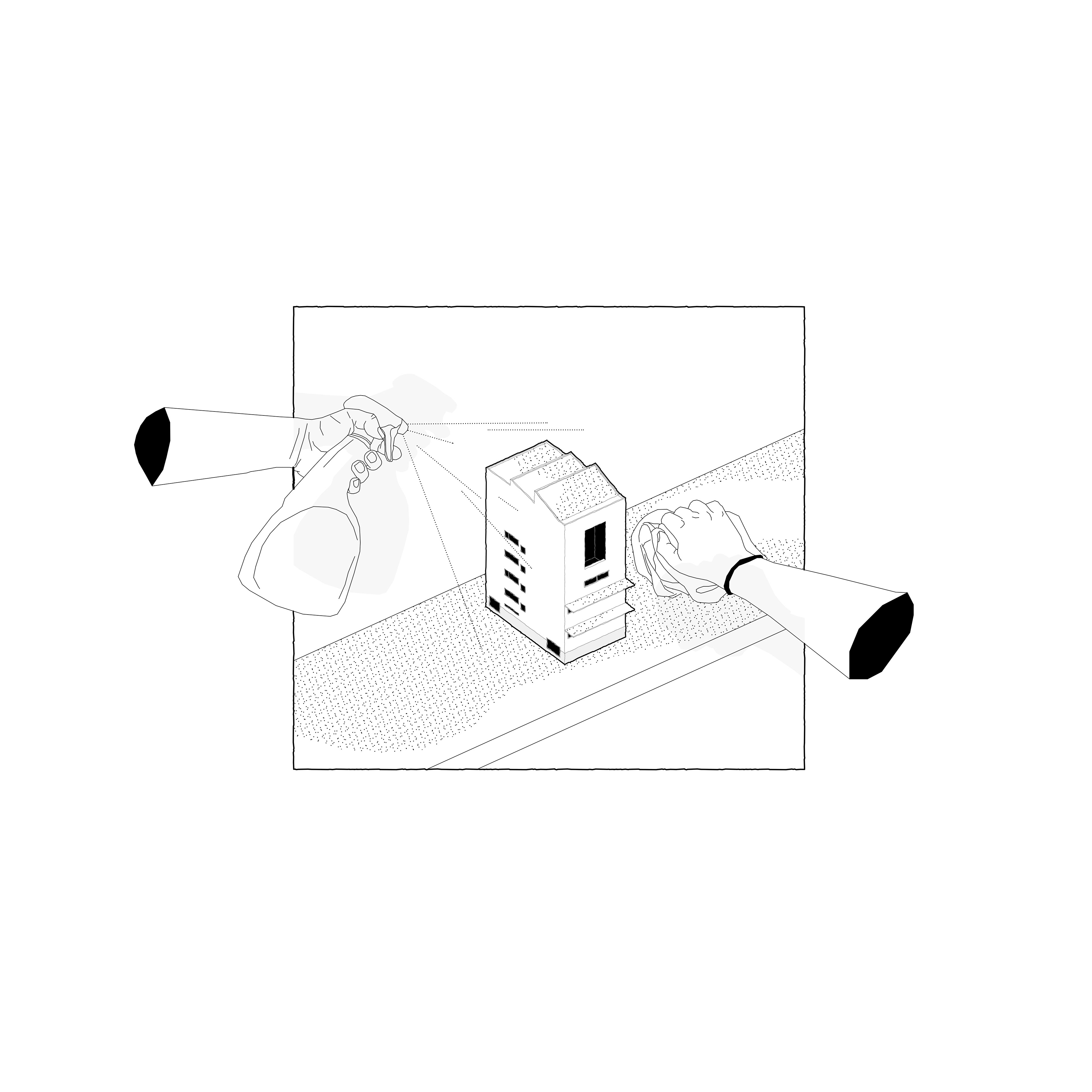
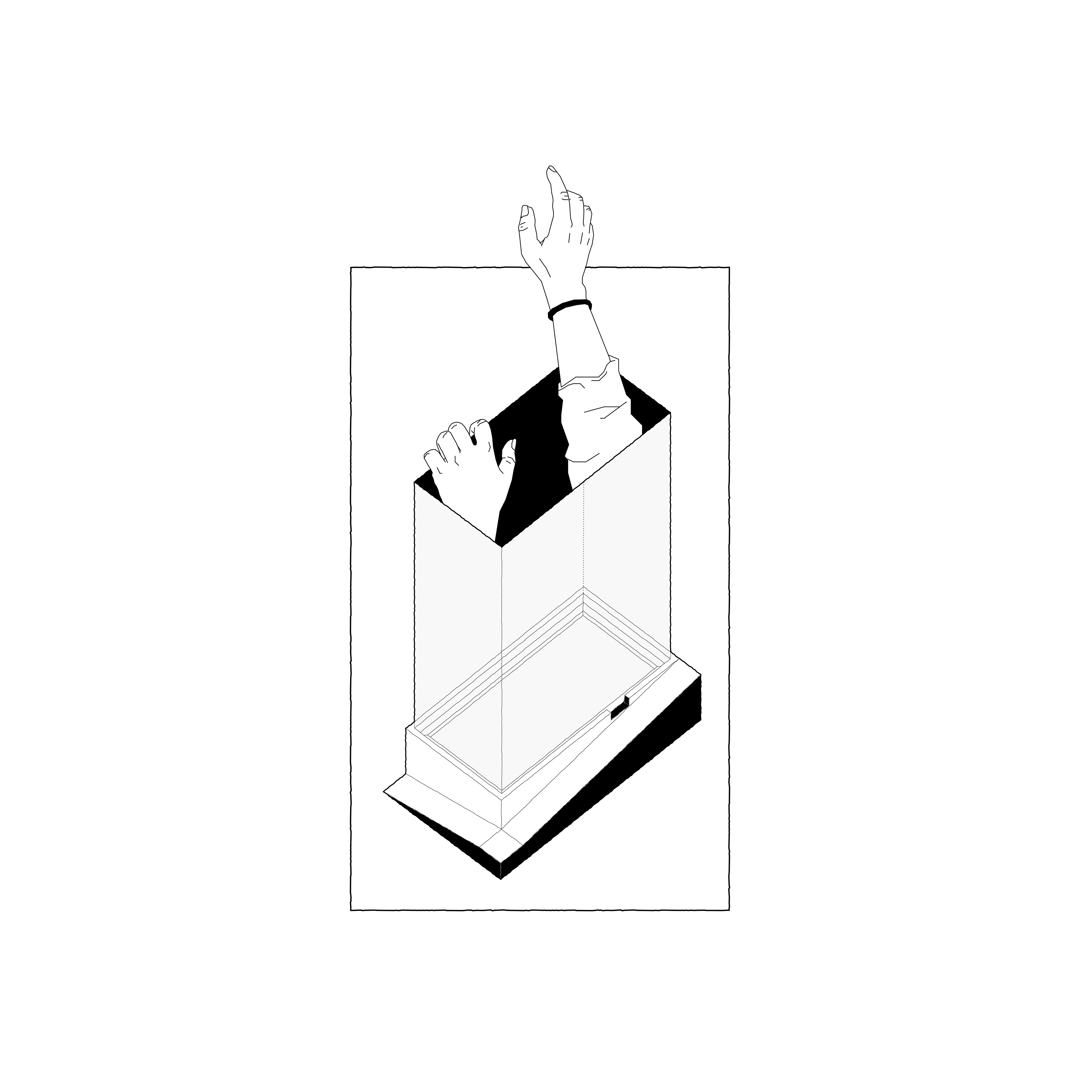
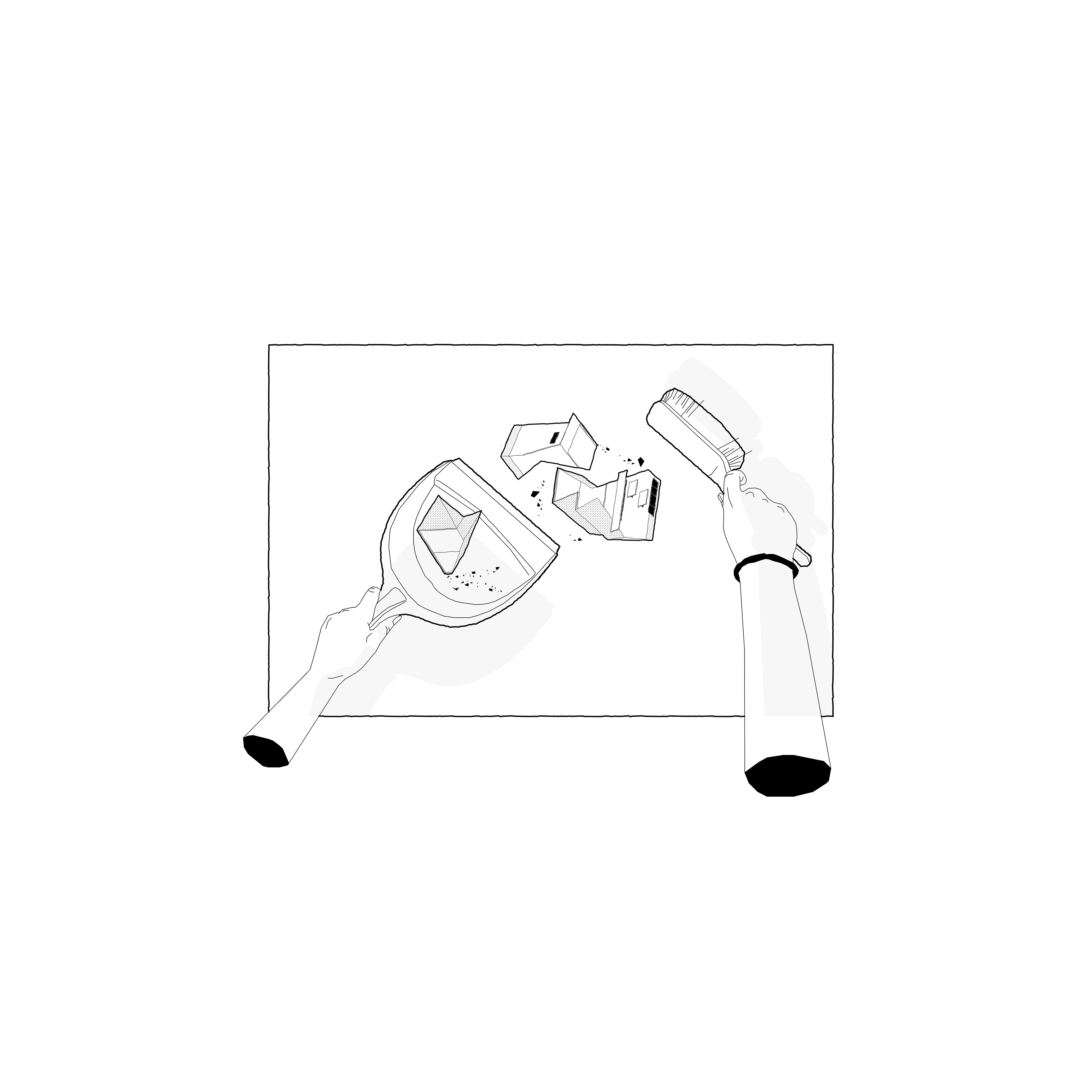
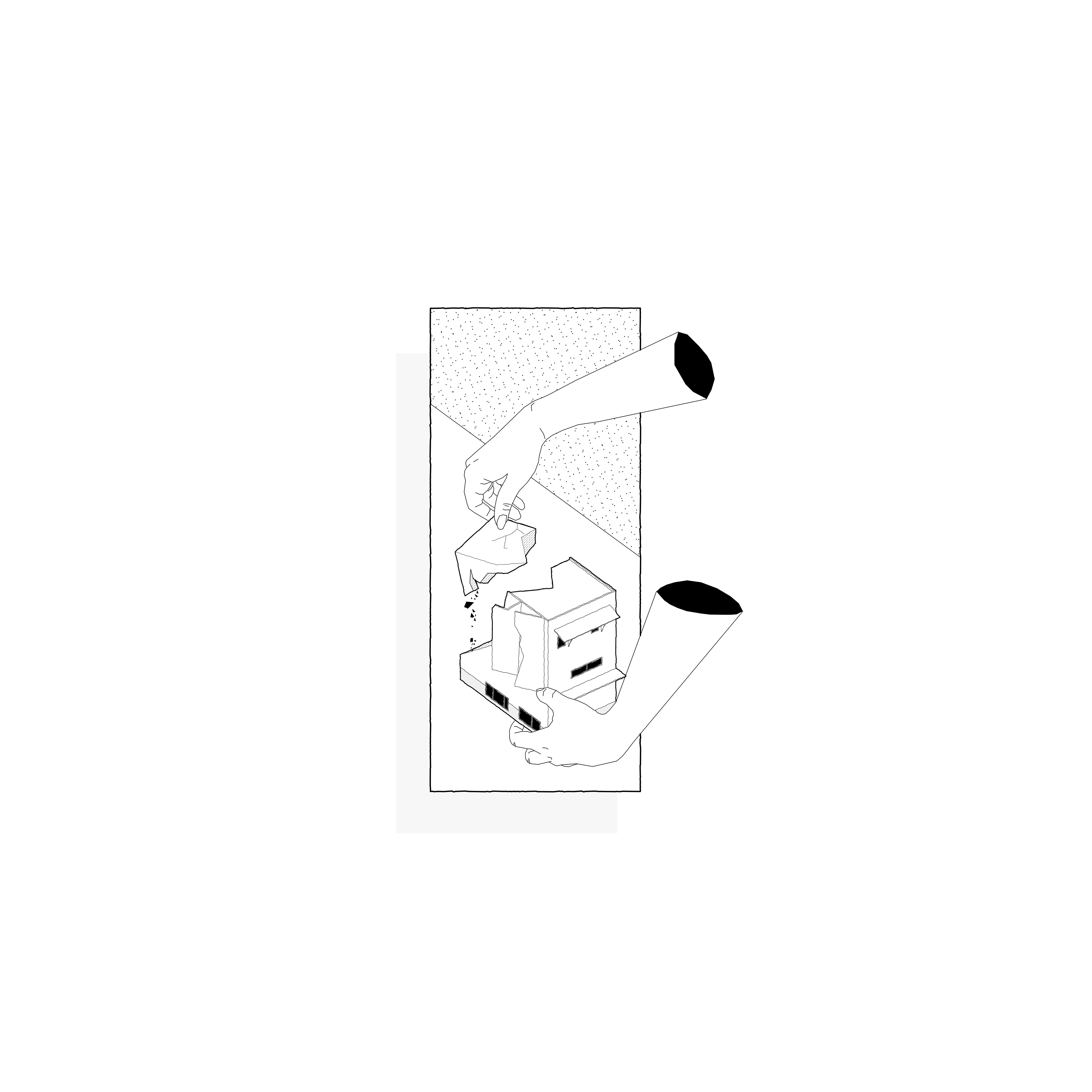
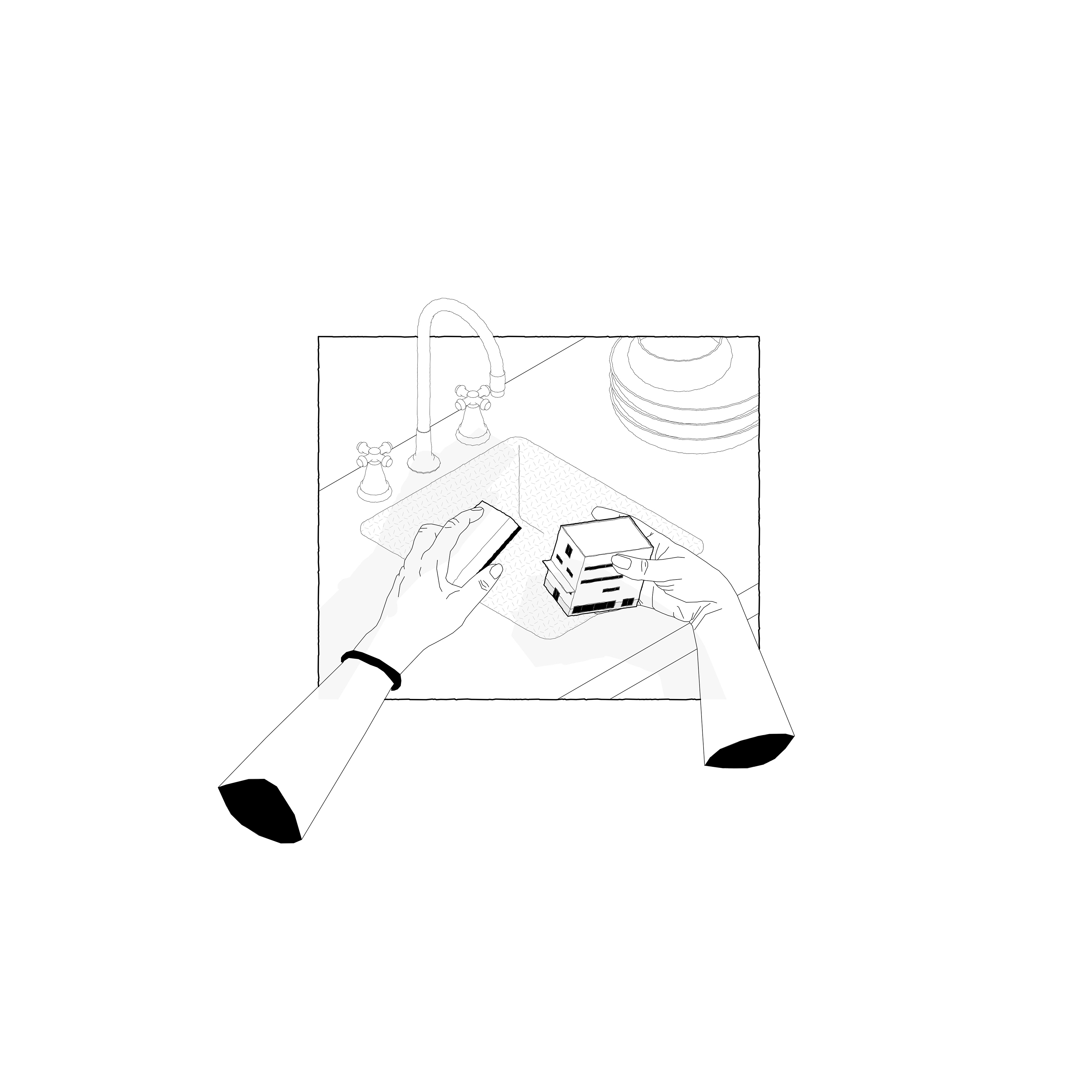
Em tempos assim, quando chega a primavera e a cidade permite alguns dias de sol e uma temperatura para além dos dezoito graus, coloco-me a cuidar de todas as pequenas coisas da casa que foram acumulando-se com o frio. Os cantos superiores da marquise, as terras antigas dos vasos das plantas, as manchas de chuva e poluição secas no vidro da janela, as roupas de praia nos fundos das gavetas e o mau humor arrastado têm, então, a minha atenção.
Nessas grandes limpezas e organizações entre estações os móveis saem do lugar, algumas roupas vão para doação e alguns documentos que considerava imprescindíveis já não têm validade para atestar minha existência, então recorto-os e deito-os como enigmas desinteressantes ao lixo. Penso que, em nível ou outro, poderia falsificar-me sem qualquer precedente, arranjar outras maneiras de estar no mundo que tivessem a discrepância exata para não me aparentar mais e ser reconhecida mesmo assim. Curiosamente, o meu cartão cidadão viaja sem mim, mas eu não cruzo uma fronteira sem ele.
De todas as tarefas, lavar a loiça e passar pano nas prateleiras são as que mais me aborrecem. Apesar de estar consciente sobre vivermos uma vida de acúmulos, pratos e talheres são um cotidiano que evito amontoar na bancada. Mas, às vezes, acontece e a pilha de loiças parece imbatível. Resisto ao ato de jogá-las todas ao chão pelo simples prazer de ver ruir algo que não quero fazer. E há tantas coisas que gostaria de ver ruir, tantas outras que não queria fazer.
As prateleiras carregam para além da poeira uma diversidade de objetos que atestam os meus gostos, minhas memórias e o lembrete -nunca solicitado- de uma faculdade que não termino. Meus gostos são baratos, porque a crise é full-time. Minhas memórias são acessíveis, porque ainda não pago para recordar os meus motivos. E as folhas, as canetas ansiosamente mordidas e os rascunhos que já não identifico a serventia costumam ser as coisas mais caras nas prateleiras.
Ensinaram-me que esta profissão é assim, dura. De um custo excepcional, uma dedicação quase-exclusiva, mas só quase, porque ainda não inventaram jeitos fisiológicos de não dormir. Um infindável esforço em páginas e mais páginas de formalismo puro e rasteiro. Resisto não como quem ignora a todos os pressupostos, mas como quem entende que, por trás de cada estrela, há milhares de pessoas como eu: com um ordenado mínimo na conta, infiltrações no tecto, computador próprio, experiência mínima de cinco anos e domínio em fotoredenrização (preferencial/diferencial). Uma vida a diferenciar-nos por requisitos preferenciais de capacidade produtiva, podem anotar.
A ler-me assim depressa, parece que lido com uma frustração tamanha: ou por falta de talento, ou por falta de esforço, ou por falta de treino, ou até mesmo por falta de contacto ou sobrenome. Eu tenho sim muitas frustrações, mas nenhuma apontada para a carência de favoritismos, ou para a falta de holofotes, ou para a probabilidade de adentrar qualquer sistema de reconhecimentos e premiações. Como a pilha de loiça, a estrutura acadêmica e profissional parece-me imbatível e apetecia-me muito vê-la ruir. Escolho, quase sempre por cansaço, arrumar a bancada da cozinha. E escolho, quase sempre por exaustão, continuar nesses lugares todos, porque apesar de todas as raivas, essa bolha que é a arquitetura me é um hábito amansado.
A obrigação da entrega (que é sempre adiada) e da presença (que quase nunca é participativa), vem sempre acompanhada de pequenas condições preferenciais, quase sempre não mencionadas e integralmente condescendentes: evite as tréplicas, a sua experiência não importa tanto assim para rebater às críticas; levante as mãos para concordar, em especial se a concordância é bibliográfica da personagem à sua frente; evite estatutos e, se possível, atropele-os: a paridade entre discentes é pura -e entre docentes, também.
Muito dos afetos que desenvolvi com as pequenas tarefas aborrecidas da casa, desenvolvi também com os aborrecimentos do meio acadêmico e profissional. A dada altura apercebi-me de que passar pano em algumas prateleiras pode não resolver a urgência de deitar fora alguns objetos e que algumas prateleiras precisam estruturar-se em outros cantos da casa ou, até, em outras casas. Com a mesma naturalidade que inexisto sob a perspectiva de um documento fora do prazo de validade, permito que esses pequenos objetos perpetuem alguns absurdos. Permitimos, com muito afinco, diria até.
Nada verdadeiramente emancipatório surgiu retido na ideia de que há uma ordem natural de todas as coisas. O espaço acadêmico, para além de me ser um recesso, é também um intermédio da minha relação com o mundo e, como qualquer processo, quando deixa de ser útil ou viável, é que mostra-me os horrores aos quais não estava atenta. Quase como uma tecla que deixa de funcionar e me faz perceber que, afinal, há um teclado entre mim e o mundo. Há um senso comum entre nós e o mundo e já iremos lá chegar.
Podem acusar livremente as minhas frustrações, mas para a grande maioria de nós a violência de ser constantemente invalidado por pequenos-poderes é encoberta pela promessa de uma prática transformadora e de uma autoria individual através, ainda, de uma propaganda dissimulada. Não há autoria individual numa prática que é imprescindivelmente concebida pelo colectivo, não há arquitetura transformadora que parta de mãos que oprimem. A propaganda, entretanto, tenho de tirar meu chapéu: custa-nos uma licenciatura e uns quebrados para percebermos que aplicamos para algo que, talvez, não estamos assim tão de acordo. Que, talvez, sacrificar a nossa saúde e a dos nossos colegas custará imenso daqui a dez anos. Para alguns de nós, já custa.
É importante alertar que não somos nenhum estado de exceção, o desmonte de uma estrutura que nos alimenta de grandes alívios ordinariamente chamados de satisfações se torna necessário quando a exaustão não é um desvio individual, mas sim um sintoma colectivo. É preciso dar nome a todos esses objetos nas prateleiras, é preciso lembrar que resistir é sublinhar que jogamos perdendo em um tabuleiro confuso e autoritário, capaz de reter nossas vivências em prescrições e outras propinas. É preciso escolher conscientemente de que pratos comemos, de que copos bebemos e quais talheres usamos. É preciso, ainda, ir além das resistências.
Há quem irá apontar ingenuidade da minha parte, há quem irá dizer que é muita abstração, porque, afinal, fomos educados a fugir dos afetos que colocam em xeque as nossas discordâncias. Fomos educados a fugir dos afetos, ponto. É horrível estar exposto ao mundo em erro, nós sabemos. Entretanto, não são abstratos os choros, os cansaços, as pressas e as desistências dos meus colegas e, certamente, não é ingênuo o cerco que se fecha sobre nós cada vez que uma sala de aula seleciona quem é válido e quem não é.
O ato de chamar às coisas aquilo que verdadeiramente são é exaustivo: não há processos seletivos, há exclusões. Não há scores, há mercado. Não há meritocracia, há privilégios. A hegemonia dessa gestão empresarial de mau gosto do ensino superior facilmente se deixa entender como senso comum e isenta de ideologias. A neutralidade dos pequenos-poderes académicos é só um precedente para que qualquer colocação crítica possa ser qualificada como um exagero, um constrangimento desnecessário ou, até, uma falta de expertise. Cooptar-nos contra nós mesmos é a melhor isenção de sempre, vejam bem.
E não é preciso bibliografia [mas deixarei ao final deste texto, na mesma] para poder afirmar que resistir é tornar visível todos os nossos desamparos, fazer com que circulem em alto e bom tom. É aceitar que a construção de uma prática pedagógica autônoma, inclusiva e atenta às nossas singularidades é um esforço descomunal, mas que precisa ser feito e precisa ser feito em conjunto, sem medo do choque das nossas diferenças e experiências.
Resistir é passar pelo abandono da esperança e do medo. A primeira, porque implica na existência da segunda em outras temporalidades de expectativa e valida um modo passivo de interação com a realidade; e a segunda, porque é a maior potência produtiva da nossa escola e da nossa profissão. É urgente tornar centrais outros afetos e outras maneiras de estar.
Ensinaram-me, então, que esta profissão é assim, dura. Duro, digo eu, é sobreviver neste mundo cão. E se pensam que o mundo não suportaria outros moldes, que estas salas de aula não admitiriam outras regras, que esta faculdade tem fundamentos essenciais e intransponíveis e que esta profissão não sustentaria qualquer outra prática que não essa baseada na contínua e velada dominação, é porque essa tal ordem natural das coisas vos favorece. E é precisamente a vocês a quem resisto: não é isto que quero ter nas minhas prateleiras, nem nas minhas bancadas e muito menos nas minhas memórias.
Como bem colocou Graeber, o mundo é algo que fazemos e que poderíamos facilmente fazer diferente. Em meio a muitos constrangimentos necessários e situações aborrecidas, os materiais na prateleira não são caros só nos recibos, custam, porque a resistência que denunciam caminha em oposição à validação dessa máquina educacional-mercantil. Pergunto-me frequentemente se queremos tanto assim ser reconhecidos por uma estrutura que nos deixa no limiar de um total descuido. Penso que não, mas em nada me comovem as nossas defensivas em querer, no mais íntimo de nós, que sim. Eu também me defenderia -e me defendi anos a fio- se tivessem me ensinado a vida toda que o outro é sempre uma ameaça em potencial.
Criar um estado constante de insegurança, suspeita e instabilidade entre discentes permite a maior das violências: usar a escola e a prática profissional de muleta para repetir todos esses pequenos-poderes e realizar o sonho latente de cometer as mesmas atrocidades não-ideológicas com o precedente de que ‘se eu sofri, você sofrerá também’. Essa tal neutralidade permite não só a reciclagem dessas supostas soberanias -que chegam por convites e outras formalidades ambíguas-, como também confere ao mal-estar, à culpa, ao cansaço e aos alívios os únicos meios institucionalmente legítimos de aprender. E sei que estamos muitos de nós neste texto, principalmente neste parágrafo.
Acabar este curso será, algum dia, um alívio. Permanecer em exageros e resistências é, e será sempre, uma satisfação. Termino este texto com um dos vários abraços escritos por Eduardo Galeano em 1989, que diz:
In times like these, when spring arrives and the city allows a few days of sun and temperatures above eighteen degrees, I set myself to take care of all the small things at home that piled up during the cold. The upper corners of the sunroom, the old soil of the plant pots, the stains of rain and pollution dried on the window glass, the beach clothes at the back of the drawers, and the lingering bad mood then have my attention.
In these big cleanings and seasonal reorganizations, the furniture moves out of place, some clothes go for donation, and certain documents I once considered indispensable no longer have validity to attest my existence. I cut them up and throw them away as uninteresting enigmas. I think that, at one level or another, I could falsify myself without precedent, invent other ways of being in the world with just the right discrepancy not to resemble myself anymore and still be recognized. Curiously, my citizen card travels without me, but I do not cross a border without it.
Of all tasks, washing the dishes and wiping the shelves are the ones that annoy me the most. Even though I am aware that we live a life of accumulations, plates and cutlery are part of the everyday that I avoid letting pile up on the counter. But sometimes it happens, and the stack of dishes seems unbeatable. I resist the act of throwing them all on the floor just for the simple pleasure of watching something I refuse to do collapse. And there are so many things I would like to see collapse, so many others I would rather not do.
The shelves carry, beyond dust, a variety of objects that attest to my tastes, my memories, and the reminder—never requested—of a degree I have not finished. My tastes are cheap, because the crisis is full-time. My memories are accessible, because I still do not pay to recall my reasons. And the sheets of paper, the pens anxiously chewed, and the drafts whose purpose I no longer recognize often end up being the most costly things to keep on the shelves.
They taught me that this profession is like this, hard. It demands exceptional cost and an almost total dedication—though never absolute, since no one has yet invented a physiological way not to sleep. An endless effort of pages and more pages of pure and shallow formalism. I resist not as someone who ignores all the assumptions, but as someone who understands that behind each star there are thousands of people like me: with a minimum wage in the bank account, leaks in the ceiling, their own computer, minimum experience of five years, and mastery of photorendering (always listed as “preferred” or “desirable” in job postings). A life reduced to distinguishing ourselves by so-called preferential requirements of productivity—take note of that.
Read this quickly and it may seem that I am dealing with enormous frustration: whether from lack of talent, effort, training, or even connections and family name. I do carry many frustrations, but none of them point to favoritism, or lack of spotlights, or the probability of entering any system of recognition and awards. Like the pile of dishes, the academic and professional structure seems unbeatable, and I would very much like to see it collapse. Almost always out of exhaustion I choose to tidy up the kitchen counter. And almost always out of the same exhaustion I choose to stay in all these spaces, because despite all my anger, this bubble that is architecture has become a tamed habit.
The obligation of delivery (which is always delayed) and of presence (which is almost never participatory) always comes with small preferential conditions, almost never mentioned and entirely condescending: avoid counter-arguments, your experience does not matter much when answering criticism; raise your hands to agree, especially if the agreement is bibliographic with the figure in front of you; avoid statutes and, if possible, run over them: equality among students is pure—and among teachers, too.
Much of the affection I developed for small annoying household tasks I also developed for the annoyances of academic and professional life. At a certain point I realized that wiping some shelves may not solve the urgency of throwing some objects away, and that some shelves need to be rebuilt in other corners of the house, or even in other houses. With the same naturalness that I cease to exist under the perspective of an expired document, I allow these small objects to perpetuate certain absurdities. We allow them, with remarkable diligence, I would even say.
Nothing truly emancipatory has ever emerged from the idea that there is a natural order of things. The academic space, beyond being a recess for me, is also an interlude in my relation with the world and, like any process, when it ceases to be useful or viable, it reveals to me the horrors I had not noticed. Almost like a key that stops working and makes me realize that, after all, there is a keyboard between me and the world. There is a common sense between us and the world, and we will get there.
They may freely accuse me of frustration, but for the vast majority of us, the violence of being constantly invalidated by small powers is covered over by the promise of a transformative practice and of individual authorship, sustained still by disguised propaganda. There is no individual authorship in a practice that is essentially conceived by the collective. There is no transformative architecture that comes from oppressive hands. As for propaganda, I must tip my hat: it costs us a degree and some loose change to realize that we are applying for something we may not actually agree with. That perhaps sacrificing our health and that of our colleagues will cost immensely ten years from now. For some of us, it already costs.
It is important to say that we are not an exception. The dismantling of a structure that feeds us small reliefs, ordinarily called satisfactions, becomes necessary when exhaustion is not an individual deviation but a collective symptom. It is necessary to name all those objects on the shelves. It is necessary to remember that to resist is to underline that we are playing a losing game on a confusing and authoritarian board, capable of trapping our experiences in prescriptions and other tolls. It is necessary to choose consciously which plates we eat from, which glasses we drink from, and which cutlery we use. It is still necessary to go beyond resistance.
Some will point out my naivety. Some will say there is too much abstraction, because after all, we were taught to flee from the affections that put our disagreements into question. We were taught to flee from affections, period. It is horrible to be exposed to the world in error, we know that. Yet the tears, the exhaustion, the rushes, and the withdrawals of my colleagues are not abstract, and certainly not naïve is the tightening circle that closes around us every time a classroom selects who is valid and who is not.
The act of naming things what they truly are is exhausting: there are no selective processes, there are exclusions. There are no scores, there is a market. There is no meritocracy, there are privileges. The hegemony of this tasteless managerial style of higher education can easily pass for common sense and claim to be ideology-free. The supposed neutrality of academic small powers is only a precedent that allows any critical stance to be labeled as an exaggeration, an unnecessary embarrassment, or even a lack of expertise. Turning us against ourselves is the cleverest exemption of all, you see.
And no bibliography is needed [though I will leave one at the end of this text anyway] to affirm that to resist is to make all our helplessness visible, to let it circulate loud and clear. It is to accept that building an autonomous, inclusive pedagogical practice attentive to our singularities is a monumental effort, but one that must be done, and must be done together, without fear of the clash of our differences and experiences.
To resist is to move through the abandonment of hope and fear. Hope, because it implies the existence of fear in other temporalities of expectation and validates a passive mode of interaction with reality. And fear, because it is the greatest productive force of our school and our profession. It is urgent to make other affections and other ways of being central.
They taught me, then, that this profession is like this, hard. But what is truly hard, I say, is surviving in this dog-eat-dog world. And if you think the world could not endure other forms, that these classrooms could not admit other rules, that this faculty has essential and insurmountable foundations, and that this profession could not sustain any other practice but one based on continuous and veiled domination, it is because that so-called natural order of things benefits you. And it is precisely you whom I resist: this is not what I want on my shelves, nor on my counters, and much less in my memories.
As Graeber put it well, the world is something we make and that we could easily make differently. Amid many necessary constraints and bothersome situations, the materials on the shelf are not expensive only in receipts; they cost, because the resistance they denounce stands in opposition to the validation of this educational-mercantile machine. I often ask myself if we truly want to be recognized by a structure that leaves us on the edge of total neglect. I think not, but I am unmoved by our defensiveness in wanting, in the most intimate part of ourselves, to say yes. I would defend myself too—and did so for years on end—if I had been taught my whole life that the other is always a potential threat.
Creating a constant state of insecurity, suspicion, and instability among students allows for the greatest violence: using the school and professional practice as a crutch to repeat all those small powers and to fulfill the latent dream of committing the same non-ideological atrocities under the precedent of “if I suffered, you will suffer too.” This supposed neutrality not only recycles these alleged sovereignties—which arrive through invitations and other ambiguous formalities—but also grants malaise, guilt, exhaustion, and small reliefs as the only institutionally legitimate ways of learning. And I know many of us are inside this text, especially in this paragraph.
Finishing this degree will one day be a relief. Remaining in exaggerations and resistances is, and will always be, a satisfaction. I close this text with one of the many written embraces of Eduardo Galeano in 1989, which says:
“O poder burocrático, diz o autor [Arkadi Rajkin], faz com
que os atos, as palavras e os pensamentos jamais se encontrem: os atos ficam no local de trabalho, as palavras nas reuniões e os pensamentos no travesseiro.
que os atos, as palavras e os pensamentos jamais se encontrem: os atos ficam no local de trabalho, as palavras nas reuniões e os pensamentos no travesseiro.
Boa parte da força de Che Guevara, penso, essa misteriosa energia que vai muito além de sua morte e de seus equívocos, vem de um fato muito simples: ele foi um raro exemplo dos que dizem o que pensam e fazem o que dizem.”
(tradução de Eric Nepomuceno)
"Bureaucratic power, says the author [Arkadi Rajkin], ensures that acts, words, and thoughts never meet: acts remain in the workplace, words in the meetings, and thoughts on the pillow.
Much of Che Guevara’s strength, I think—this mysterious energy that goes far beyond his death and his mistakes—comes from a very simple fact: he was one of those rare people who said what he thought and did what he said."
(Unofficial translation from Eduardo Galeano’s Livro dos Abraços)
bibliografia
BUCKLAND, Michael. Information and Society. The M.I.T Press Essential Knowledge Series. 1. M.I.T. Press, Cambridge, Massachusetts, 2017.
_
FERRO, Sérgio. Arquitetura e trabalho livre. Coleção Face Norte, volume 09. São Paulo, Cosac Naify, 2006.
_
FREIRE, Paulo. Pedagogia da autonomia: saberes necessários a prática educativa. São Paulo: Paz e Terra, 2004
_
GALEANO, Eduardo. O livro dos abraços. Trad. Eric Nepomuceno. 9ª. Edição, Porto Alegre: L&PM, 2002.
_
GRAEBER, David. The Utopia of Rules: On technology, Stupidity, and the secret Joys of Bureaucracy. Melville House Publishing, Londres, 2015.
_
HOOKS, Bell. Ensinando a transgredir: a educação como prática da liberdade. Tradução: Marcelo Brandão Cipolla. 2ª Ed. São Paulo:
Editora Martins Fontes, 2017
_
MAIA, Heribaldo. Neoliberalismo e o sofrimento psíquico: o mal-estar nas universidades. Ed. Ruptura. Recife, Brasil, 2022
_
SAFATLE, Vladimir. O circuito dos afetos: Corpos políticos, desamparo e o fifim do indivíduo. São Paulo: CosacNaify, 2015
BUCKLAND, Michael. Information and Society. The M.I.T Press Essential Knowledge Series. 1. M.I.T. Press, Cambridge, Massachusetts, 2017.
_
FERRO, Sérgio. Arquitetura e trabalho livre. Coleção Face Norte, volume 09. São Paulo, Cosac Naify, 2006.
_
FREIRE, Paulo. Pedagogia da autonomia: saberes necessários a prática educativa. São Paulo: Paz e Terra, 2004
_
GALEANO, Eduardo. O livro dos abraços. Trad. Eric Nepomuceno. 9ª. Edição, Porto Alegre: L&PM, 2002.
_
GRAEBER, David. The Utopia of Rules: On technology, Stupidity, and the secret Joys of Bureaucracy. Melville House Publishing, Londres, 2015.
_
HOOKS, Bell. Ensinando a transgredir: a educação como prática da liberdade. Tradução: Marcelo Brandão Cipolla. 2ª Ed. São Paulo:
Editora Martins Fontes, 2017
_
MAIA, Heribaldo. Neoliberalismo e o sofrimento psíquico: o mal-estar nas universidades. Ed. Ruptura. Recife, Brasil, 2022
_
SAFATLE, Vladimir. O circuito dos afetos: Corpos políticos, desamparo e o fifim do indivíduo. São Paulo: CosacNaify, 2015